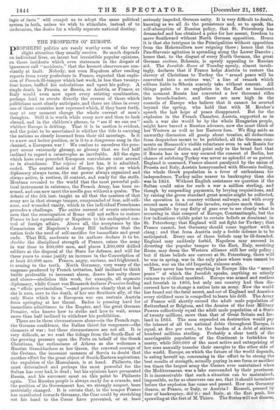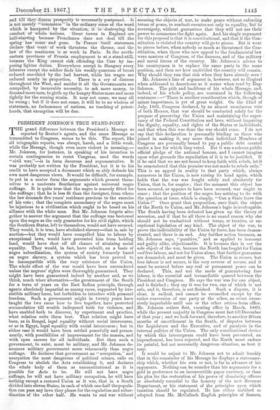THE PROSPECTS OF EUROPE.
PROPHETIC politics are rarely worthy even of the very slight attention they usually receive. So much depends on individual lives, on latent but irresistible popular opinions, on those incidents which even statesmen in the despair of ignorance call "accidents," that the keenest observers are con- stantly at fault. Nobody, not even Napoleon after reading reports from 'every prefecture in France, expected that explo- sion of French ill-temper which last week, in less than twenty- four hours, baffled his calculations and upset his policy. A single death in Prussia, or Russia, or Austria, or France, or Italy would even now upset every existing combination, perhaps lead to events directly the reverse of those which politicians most clearly anticipate, and there are ideas in every one of these countries now repressed which, if they burst forth, may at any moment change the whole current of men's thoughts. Still it is worth while every now and then to look abroad, and in the children's phrase, to " see if we can see " whither Europe is drifting. That it is in motion is evident, and the point to be ascertained is whither the tide is carrying the nations so clearly loosened from their old moorings. Is it to a new and better position, or is it to a dangerous snag in the channel, a European war ? We confess to ourselves the pros- pect seems extremely gloomy, so gloomy that we feel half inclined to regard a catastrophe as inevitable. All the signs which have ever preceded European convulsions exist around us in abundance. The regime of law has, it is admitted, ended. The central nation of Europe, the pivot on which diplomacy always turns, the one power always organized and always active, is restless, ill content, and ready for the strife. Mentana revealed to the world that the most powerful poli- tical instrument in existence, the French Army, has been re- armed, and can now meet the needle gun without a qualm. The debate of the 5th inst. taught us all that the masters of that army are in that strange temper, compounded of fear, self-reli- ance, and wounded vanity, which in the individual Frenchman precedes a challenge. The entire current of events convinces men that the reoccupation of Rome will not suffice to restore France to her equanimity or Napoleon to his undisputed con- trol of foreign affairs. Above all, the acceptance by the Commission of Napoleon's Army Bill indicates that the nation feels the need of self-sacrifice for immediate and great ends. . That Bill, moderate as its authors declare it to be, doubles the disciplined strength of France, raises the army in war time to 800,000 men, and places 1,200,000 drilled soldiers at the disposal of the State for defence, and will for three years to come justify an increase in the Conscription of at least 50,000 men. France, angry, envious, and frightened, is arming to the teeth. North Germany, very weary of the suspense produced by French irritation, half inclined to think battle preferable to incessant alarm, draws her unity closer and closer—abolishes this week, for example, all separate diplomacy, while Count von Bismarck declares Prussian feeling an " effete provincialism "—and perceives clearly that at last she is sure, sure to the death, of her one Southern ally, of the only State which in a European war can restrain Austria from springing at her throat. Baden is pressing hard for immediate admittance to the Empire, and the great German Premier, who knows how to strike and how to wait, seems more than half inclined to withdraw his prohibition.
There are in these circumstances alone—in the French rage, the German confidence, the Italian thirst for vengeance—the elements of war ; but these circumstances are not all. It is very difficult, as we read the tidings from the South-East of the growing pressure upon the Porte on behalf of the Greek Christians, the enthusiasm of Athens as she welcomes a Russian Grandduchess as her Queen, the renewed courage of the Cretans, the incessant menaces of Servia to doubt that another effort for the great object of South-Eastern aspirations, the expulsion of the Mussulman, is at hand. Philarete, the most determined and perhaps the most powerful foe the Sultan has ever had, is dead ; but his opinions have permeated Russia, and his successor must on this point be Philarete again. The Russian people is always ready for a crusade, and the position of its Government has, we strongly suspect, been materially changed. It is certain that, in the temper France has manifested towards Germany, the Czar could by stretching out his hand to the Caesar have prevented, or at least seriously impeded, German unity. It is very difficult to doubt, knowing as we all do the persistence and, so to speak, the self-absorption of Russian policy, that St. Petersburg has demanded and has obtained a price for her assent, freedom to move Southward without North German opposition. Hence it is that she intrigues in the Principalities without opposition from the Hohenzollern now reigning there ; hence that the Pan-Slavonic agitation is spreading along the Lower Danube ; hence that, to the disgust of every North German, the great German enclave, Bohemia, is openly appealing to Russian aid. The Invalids Rune of Tuesday openly, almost insult- ingly, declares that if France helps Austria to restore the slavery of Christians to Turkey the " armed peace will be converted into a serious war," a line of remark which editors liable to Siberia scarcely take without consent. All things point to an explosion in the East as imminent the moment Russia has converted a few thousand rifles into breech-loaders, and there are men high in the councils of Europe who believe that it cannot be averted beyond the spring, who hold that with M. Rouher's speech the last hope of peace disappeared. But for the explosion in the French Chamber, Austria, supported as in such a war she would be by the whole Hungarian people, might have barred a Russian advance, now she must think of her Western as well as her Eastern foes. We fling aside as unworthy discussion all gossip about treaties, all deductions from despatches meant to be published, all the German com- ments on Bismarck's visible reluctance even to ask Russia for milder customs' duties, and point only to the broad fact that if Russia has in any way secured the consent of Berlin, her chance of subduing Turkey was never so splendid or so patent. England is unarmed, France almost paralyzed by the union of Prussia and Italy, Austria honeycombed with Slavonic feeling, the whole Greek population in a fever of enthusiasm for independence, Turkey miles nearer to bankruptcy than she was in 1854. Without English assistance we question if the Sultan could raise for such a war a million sterling, and though by suspending payments, by levying requisitions, and by raising the green standard great armies might be collected, the operation in a country without railways, and with every second man a friend of the invader, requires much time. It is impossible by any fixity of gaze ever to see clearly what is occurring in that cesspool of Europe, Constantinople, but the few indications visible point to certain beliefs as dominant in St. Petersburg; that England will not fight for Turkey; that France cannot, lest Germany should come together with a clang ; and that from Austria only a feeble defence is to be anticipated. Every one of those beliefs may be ill-founded. England may suddenly forbid, Napoleon may succeed in diverting the popular temper to the East, Italy, receiving Rome, may deem the Western affiance still her only policy ; but if those beliefs are current at St. Petersburg, there will be war in spring, war in the only place where wars cannot be sudden, war on the old Imperial, ruinous scale.
There never has been anything in Europe like the " armed peace " of which the Invalids speaks, anything so utterly ruinous to civilized mankind. Europe was armed and restless and feverish in 1805, but only one country had then dis- covered how to change a nation into an army. Now the world has found out the fatal secret, and out of England and America every civilized man is compelled to learn his drill. The Army of France will shortly exceed the adult male population of Switzerland or Belgium, and the Armies of the four Military Powers collectively equal the adult male population of a State of twenty millions, more than that of Great Britain and Ire- land in 1815. The sum expended on destruction would pay the interest of all the national debts throughout Europe, is equal, at five per cent., to the burden of a debt of sixteen hundred millions sterling. Probably a clear tenth of the marriageable population of the Continent is forbidden to marry, while 300,000 of the most active and enterprising of her sons annually transfer their energies to the other side of the world. Europe, on which the future of the world depends, is eating herself up, consuming in the effort to be strong the best results of strength, actually paying in one form or another ten times the largest army the Camara ever maintained when the Mediterranean was a lake surrounded by their provinces. It is inconceivable that such a situation can be maintained, impossible, so far as observers can see, that it should terminate before the explosion has come and passed. How can Germany disarm, or France, or Italy, or Austria ? Ricasoli, pressed by fear of bankruptcy, did-it ; and Italy, at the first push, lies sprawling at the feet a M. Thiers. The &atm' will not disarm, and tat they disarm is-necessarily postponed. - • It is not "-eon:melte' in the ordinary sense of the' ord which is hampered by the situation, 'it is.• destroying the comfort of whole =nations. Great towns in England are half-Starling because Frenchmen ,• dare not deal till the spring has come., and- gone. In -France itself statesmen declare that want of work threatens the throne, -and, the law - of- the maximum is at work in Paris. In the north- eastern provinces of Prussia employment is at a stand-still, because -the 'King cannot risk offending the Czar •by im- posing lighter duties. Everywhere except in Hungary every labourer except the soldier finds his weekly quantum of bread reduced one-third by- the bad harvest, while his wages are reduced nearly in proportion. There is a cry of distress throughout the- West, and -amidst it all the Governments are compelled, by inexorable necessity, to ask more money, to demand more men, to girth up the hungry States more and more tightly for the coming strain. It may not come, we may all be wrong ; but if • it does not come, it will be to no wisdom of statesmen, no forbearance of nations, no teaching of priest- hoods, that exemption will be due.







































 Previous page
Previous page